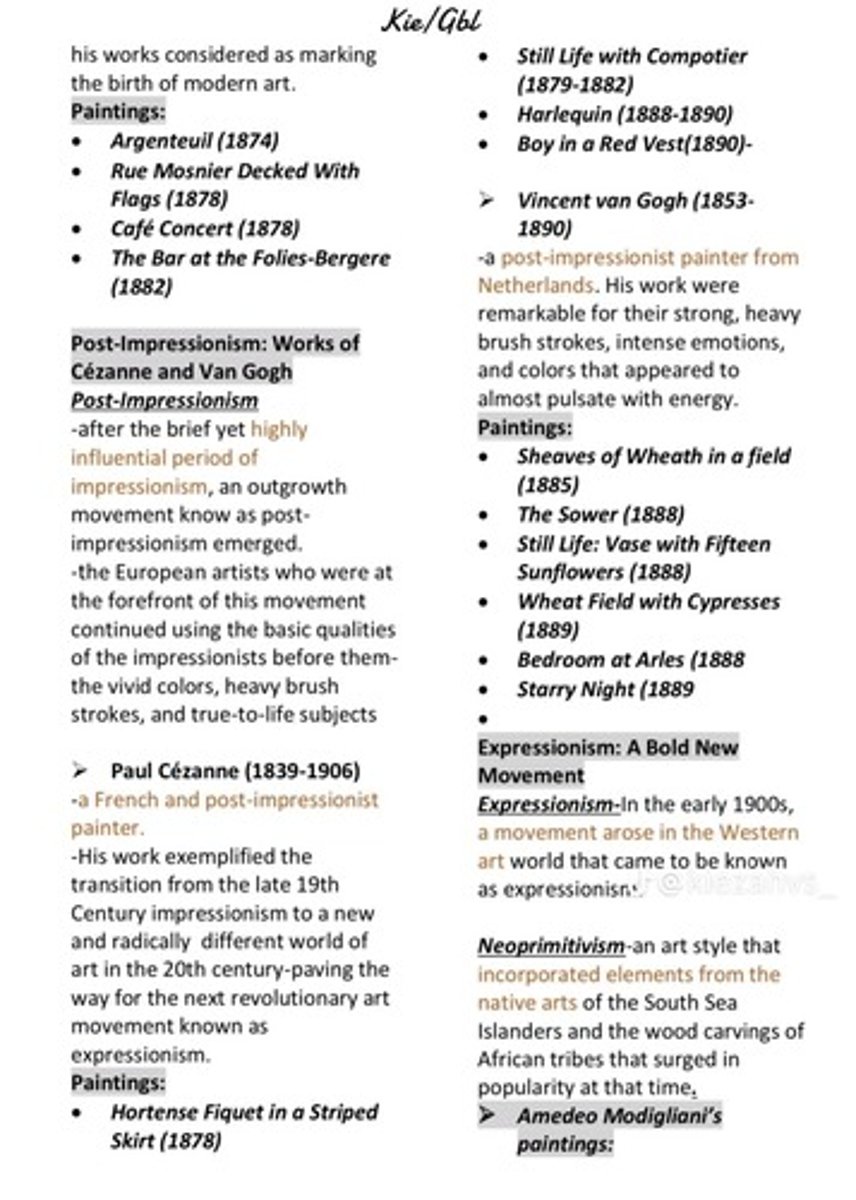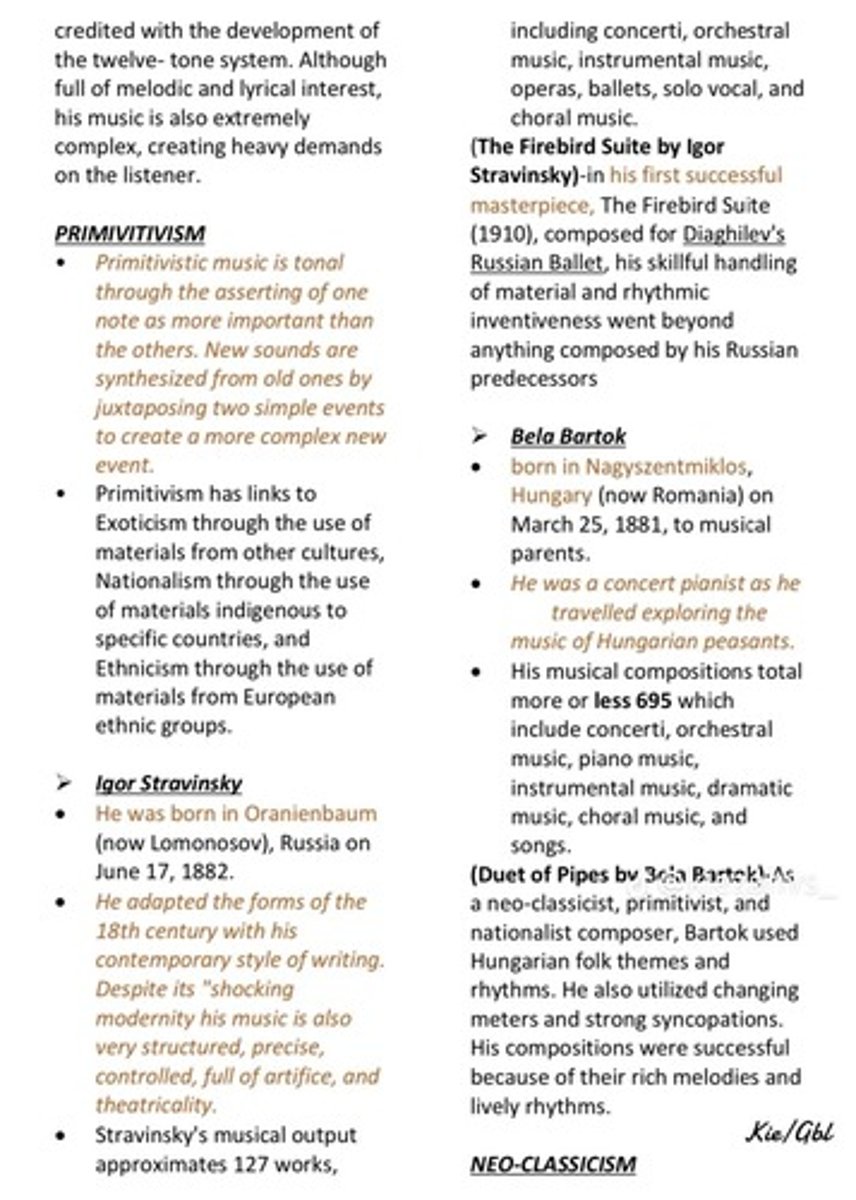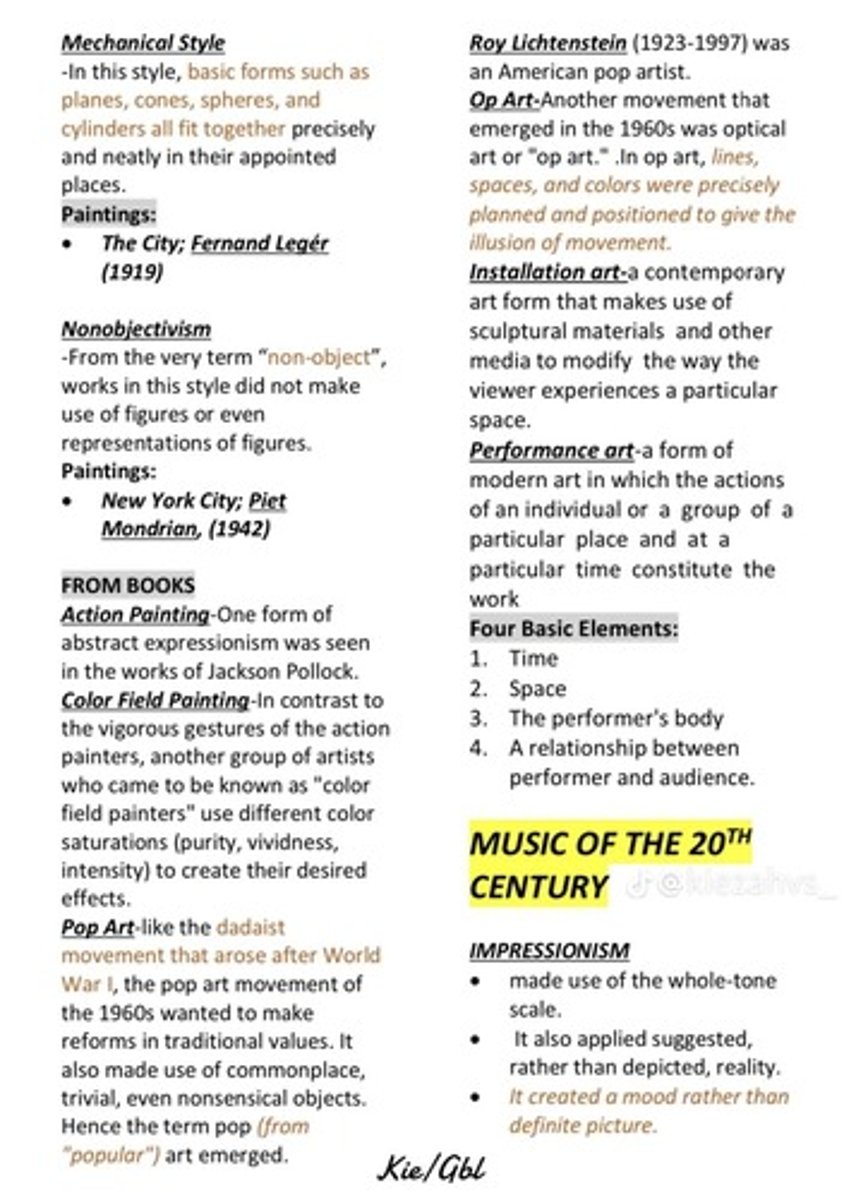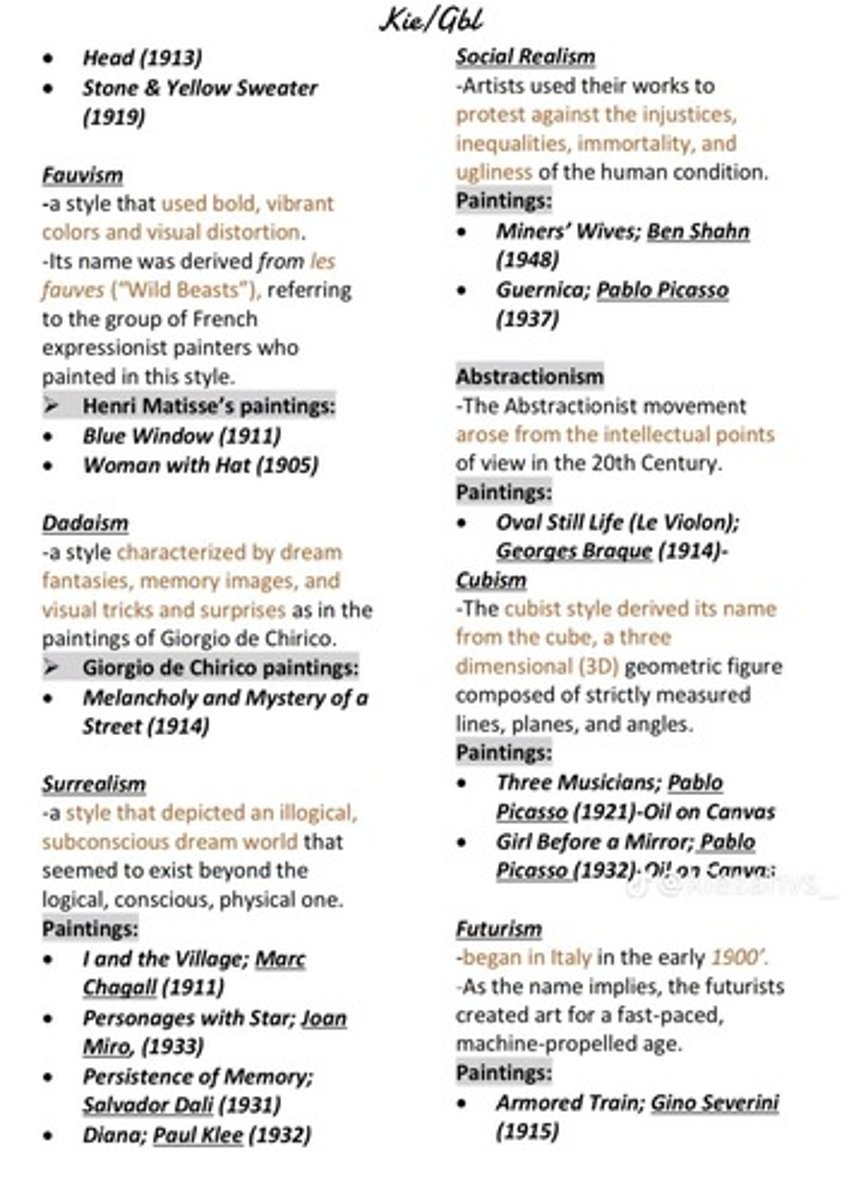Impressionism, Post-Impressionism, and 20th Century Art Movements
1/190
There's no tags or description
Looks like no tags are added yet.
Name | Mastery | Learn | Test | Matching | Spaced |
|---|
No study sessions yet.
191 Terms
What is Impressionism?
An art movement that emerged in the second half of the 19th century among Paris-based artists, characterized by capturing fleeting moments.

How did photography influence Impressionism?
Photography inspired Impressionists to capture fleeting moments, allowing painters to express subjective views rather than objective representations.
Who coined the term 'Impressionism'?
The term was coined from Claude Monet's painting titled 'Impression, soleil levant' (Impression, Sunrise).
Name one of the founders of the Impressionist movement.
Claude Monet, along with Auguste Renoir, Alfred Sisley, and Frédéric Bazille.
What is one of Claude Monet's notable paintings?
'Bridge Over a Pond of Water Lilies' (1899).
Who was Auguste Renoir?
A central figure of the Impressionist movement known for his vibrant use of color and light.
What is one of Auguste Renoir's notable paintings?
'Dancer' (1874).
Who was Edouard Manet and what was his significance?
A key figure in the transition from realism to Impressionism, known for depicting modern-life subjects.
What is one of Edouard Manet's notable paintings?
'The Bar at the Folies-Bergere' (1882).
What is Post-Impressionism?
An outgrowth movement of Impressionism that emerged after its brief yet influential period.
Name a notable work by Vincent van Gogh.
'Starry Night' (1889).
What characterized Vincent van Gogh's painting style?
Strong, heavy brush strokes, intense emotions, and vibrant colors.
Who was Paul Cézanne and what was his contribution to art?
A French post-Impressionist painter whose work marked the transition to 20th-century art and paved the way for Expressionism.
What is one of Paul Cézanne's notable paintings?
'Wheat Field with Cypresses' (1889).
What is Expressionism?
An early 20th-century movement in Western art that emphasized emotional experience over physical reality.

What is Neoprimitivism?
An art style that incorporated elements from the native arts of South Sea Islanders and African wood carvings.
What are the three components of Consumer Health?
Health information, health products, and health services.

What is the aim of Consumer Health?
To develop a person's ability to evaluate and utilize health information, products, and services effectively.
What is one of the notable works of Vincent van Gogh?
'Still Life: Vase with Fifteen Sunflowers' (1888).
What is one of the notable works of Paul Cézanne?
'Hortense Fiquet in a Striped Skirt' (1878).
What was the main focus of Impressionist painters?
To capture the effects of light and color in their work, often depicting everyday subjects.
What was a common theme in the works of Impressionist artists?
Snapshots of real life, focusing on everyday moments and scenes.
How did Impressionists differ from photographers of their time?
Impressionists expressed personal perceptions and manipulated color, while photographers provided objective images.
What was the impact of Impressionism on modern art?
It laid the groundwork for subsequent movements like Post-Impressionism and Expressionism.
What is health information?
Health information is ideas and advice from various sources that influence health decisions and choices.
What are some topics covered by health information?
Topics include diseases, sexual health, weight management, drugs and alcohol, mental illness, violence, smoking, eating disorders, skin care, and local clinics.
What are the important characteristics of health information?
Health information should be timely, relevant, culturally appropriate, accessible, and delivered in a relevant format.
What are health products?
Health products are items consumed to improve well-being, including medicine, food, cosmetics, and devices.
What are some sources of health information and products?
Sources include people, media, and technology.
Who are considered reliable sources of health information?
Licensed professionals with specialized education and training in health-related fields.
What is mechanical style in art?
Mechanical style uses basic forms like planes and cylinders that fit together precisely.
What is non-objectivism in art?
Non-objectivism does not use figures or representations, focusing instead on abstract forms.
What is action painting?
Action painting is a form of abstract expressionism characterized by vigorous gestures, exemplified by Jackson Pollock.
What defines color field painting?
Color field painting uses different color saturations to create effects, contrasting with the gestures of action painting.
What is pop art?
Pop art emerged in the 1960s, using commonplace objects to challenge traditional values, with artists like Roy Lichtenstein.
What is op art?
Op art, or optical art, uses precisely planned lines and colors to create the illusion of movement.
What is installation art?
Installation art modifies viewer experience using sculptural materials and various media.
What is performance art?
Performance art involves actions by individuals or groups at specific times and places, constituting the artwork.
What are the four basic elements of performance art?
The four elements are time, space, the performer's body, and the relationship between performer and audience.
What characterizes impressionism in music?
Impressionism in music uses the whole-tone scale and suggests rather than depicts reality, creating mood.

Who is credited with developing the twelve-tone system in music?
Arnold Schoenberg is credited with the development of the twelve-tone system.
What is primitivism in music?
Primitivism asserts one note as more important, synthesizing new sounds from old ones.
How does primitivism relate to other musical concepts?
Primitivism links to exoticism, nationalism, and ethnicism through the use of diverse cultural materials.
Who is Igor Stravinsky?
Igor Stravinsky was a Russian composer known for adapting 18th-century forms with a modern style.
What is notable about Stravinsky's music?
Stravinsky's music is structured, precise, and theatrical, often described as shockingly modern.
What types of works did Igor Stravinsky compose?
Stravinsky's output includes concerti, orchestral music, instrumental music, operas, ballets, solo vocal, and choral music.
What is Stravinsky's first successful masterpiece?
The Firebird Suite, composed in 1910 for Diaghilev's Russian Ballet.
What musical styles did Bela Bartok incorporate into his compositions?
Bartok was a neo-classicist, primitivist, and nationalist composer who used Hungarian folk themes and rhythms.
How many musical compositions did Bela Bartok create?
Bartok's compositions total approximately 695.
What are the characteristics of Bartok's musical compositions?
They feature rich melodies, lively rhythms, changing meters, and strong syncopations.
What is an analogous color scheme?
An analogous color scheme consists of 3-4 colors that are next to each other on the color wheel.
What is a triadic color scheme?
A triadic color scheme uses three colors that are equally spaced apart on the color wheel.
What are the properties of color?
Hue (the actual color), intensity (brightness or dullness), and value (darkness or lightness).
What are warm colors and how do they affect artwork?
Warm colors (reds, yellows, oranges) seem to advance in an artwork.
What are cool colors and how do they affect artwork?
Cool colors (blues, greens, violets) seem to recede in an artwork.
What is the importance of value in art?
Value imitates natural light and makes objects appear more real.
What is a light source in art?
The place where light comes from, affecting the darkest areas in a drawing.
What is a monochromatic color scheme?
A monochromatic color scheme uses only one color plus its tints and shades.
What is a tint in color theory?
A tint is a color plus white.
What is a shade in color theory?
A shade is a color plus black.
Who is Sergei Prokofiev and what is his musical style?
Prokofiev is regarded as a neo-classicist, nationalist, and avant-garde composer known for his progressive technique and melodic directness.
What is Francis Poulenc known for in his compositions?
Poulenc's compositions exhibit a coolly elegant modernity with a classical sense of proportion.
What group was Francis Poulenc a member of?
He was a member of 'Les Six'.
What is unique about Georges Auric's music?
Auric wrote music for movies and rhythmic music with lots of energy.
What was Louis Durey's approach to composition?
Durey used traditional ways of composing but wrote in his own personal style, avoiding strict forms.
What did Arthur Honegger prefer in his musical works?
Honegger liked chamber music and symphonies.
What is Darius Milhaud known for in his compositions?
Milhaud wrote in several different styles, including bitonality and polytonality.
Who was Germaine Tailleferre?
Tailleferre was the only female composer in 'Les Six' and liked to use dance rhythms.
What is avant-garde music associated with?
Avant-garde music is closely associated with electronic music and explores the dimensions of sound in space.
What was George Gershwin's notable talent?
Gershwin was known for his phenomenal melodic gift, evidenced by his numerous widely appealing songs.
Who is Leonard Bernstein and what is he known for?
Leonard Bernstein was a charismatic conductor, pianist, composer, and lecturer from Massachusetts, USA, best known for his stage compositions.
What are the two types of texture in art?
1. Tactile/Real Texture: the actual feel of an object. 2. Implied Texture: the appearance of texture that cannot be felt.
What is the difference between positive and negative space in art?
Positive space refers to the area occupied by objects, while negative space refers to the area around and between those objects.
What are the three parts of space in art?
Foreground, Middle Ground, and Background.
What is shallow space in art?
Shallow space is used when objects are very close to the viewer.
What is deep space in art?
Deep space may show objects up close as well as far away, creating a sense of depth.
How does perspective work in art?
Perspective uses a vanishing point on the horizon to create a sense of deep space, with objects appearing smaller as they get closer to the vanishing point.
What is balance in the context of physical fitness?
Balance is the maintenance of equilibrium while stationary or moving.
What does coordination refer to in physical fitness?
Coordination relates to the ability to use senses with body parts to perform motor tasks smoothly and accurately.
What is reaction time in physical fitness?
Reaction time is the amount of time it takes to respond to a stimulus.
What does the F.I.T.T principle stand for in exercise?
Frequency, Intensity, Time, and Type of exercise.
What does the Principle of Overload state?
The Principle of Overload states that training must exceed the normal demands placed on the body to improve fitness.
What is the Principle of Specificity in fitness training?
The Principle of Specificity indicates that training must be specific to the sport or activity, the type of fitness required, and the particular muscle groups.
What does the Principle of Progression indicate?
The Principle of Progression indicates that the load of exercise should be gradually increased over time for effective and safe results.
What is the Principle of Variation in fitness training?
The Principle of Variation involves alternating hard workouts with easier ones and varying locations to introduce variability into a fitness program.
What is the Principle of Recovery in fitness?
The Principle of Recovery states that the body needs time to adapt to the demands placed on it.
How is physical fitness defined?
Physical fitness is defined as a condition in which an individual has enough energy to avoid fatigue and enjoy life.
What are the two categories of physical fitness?
Health-Related Fitness and Skill-Related Fitness.
What does Health-Related Fitness refer to?
Health-Related Fitness refers to physical attributes that enable a person to cope with daily living requirements.
What is Body Composition in fitness?
Body Composition refers to the body's relative amount of fat to fat-free mass.
What is Body Mass Index (BMI)?
BMI is a measure of body fat based on height and weight.
What does weight refer to in the context of physical fitness?
Weight refers to the heaviness or lightness of a person.
What is cardiovascular endurance?
The ability of the heart, lungs, and blood vessels to deliver oxygen to working muscles and tissues.
Define strength in fitness terms.
The ability of muscle to generate force against a physical object.
What does flexibility refer to in fitness?
The ability of the muscles and joints to move through their full range of motion.
What is skill-related fitness?
Physical abilities that show potential for good performance in certain skills, usually in sports.
What is speed in the context of fitness?
The ability to perform a movement in one direction in the shortest period of time.
Define agility as it relates to fitness.
The ability to move in different directions quickly using a combination of balance, coordination, speed, strength, and endurance.
What is power in fitness terminology?
The ability of the muscle to transfer energy and release maximum force at a fast rate.
What is Fauvism in art?
A style that used bold, vibrant colors and visual distortion, named after 'les fauves' (Wild Beasts), a group of French expressionist painters.
